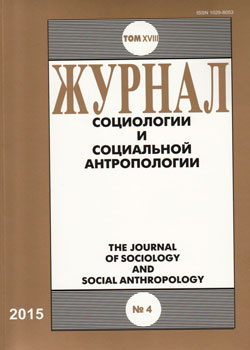Varieties in the Sociology of Elites
Keywords:
elite, sociology of elites, elite identification approaches (strategies), positional (institutional) approach, reputational approach, decisional (issue) approach, recruitment approach
Abstract
Sociology of elites is a diversified discipline. Its internal differentiation is determined by the theoretical factors and factors external to the science. The article analyzes the theoretical and methodological foundations of the different identification strategies of power elites and their explications in sociological studies. The author studies the positional (institutional), reputational, decisional (issue) and recruitment identification approaches. It is shown that the foundations of apparently similar research strategies in their initial stage can vary considerably, and the theory on which they are based, may not be fully compatible. This fact can significantly affect the interpretation of the results and their comparability. However, the same theoretical grounds may presuppose various identification approaches that make it possible to use various identification approaches within a single study. The scientist’s choice of research strategy besides the theoretical foundations depends on his or her ideological preferences as well. The author explores the possibilities and limitations of the various approaches in the study of elites and power groups.
Published
2015-05-20
How to Cite
Duka, A. (2015). Varieties in the Sociology of Elites . ZHURNAL SOTSIOLOGII I SOTSIALNOY ANTROPOLOGII (The Journal of Sociology and Social Anthropology), 18(4), 5–23. Retrieved from http://jourssa.ru/jourssa/article/view/411
Section
Sociology of Elites

